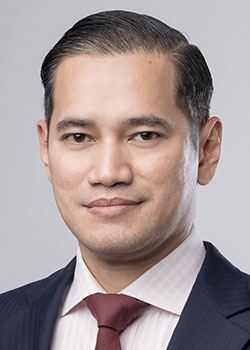

GC: What do you see as the main points that differentiate TNB & Partners from your competitors?
Kresna Panggabean (KP): We are one of the few international firms operating a disputes practice in Indonesia. Most international businesses know that Indonesian courts can be notoriously challenging to navigate and that the legal market for dispute resolution is dominated by local players. While we are happy to provide clients with a full service offering, we do not focus on matters in the local courts. Instead, we focus on cross-border corporate disputes where we can plug into the strength of the Norton Rose Fulbright network to add value.
Benny Bernarto (BB): Norton Rose Fulbright has been an established presence in Indonesia for nearly 30 years from its Australian connection and has, through various forms of associations and incorporations, acquired longstanding expertise in the Indonesian market. While the core strength of our practice in Indonesia has been handling corporate and banking and finance transactions, over the last three years we have been putting a lot of effort into building our dispute resolutions offering, working hard to increase the capacity of the firm to serve clients on a broader range of matters.
We (Kresna and I) are corporate lawyers by background, which helps a lot in understanding the nature of corporate disputes. In my experience, there are not many disputes lawyers in the Indonesian market who have a strong corporate background or understand complex, cross-border corporate transactions. We have knowledge of how international companies operate and can follow what our partners across Norton Rose Fulbright have seen in other jurisdictions and bring that expertise to bear on matters in Indonesia.
As a rule, clients want to work with the same firm or lawyers. If a dispute arises in connection with an M&A they want to stay with the same firm. Likewise, clients who deal with Norton Rose Fulbright offices outside Indonesia want to keep the same firm if they end up facing a dispute elsewhere. Because these clients are based outside Indonesia they are often unfamiliar with the very unique market dynamics
GC: What are some of the trends facing the dispute resolution landscape in Indonesia?
BB: Business is becoming more disputatious and client demand for dispute resolution services is increasing. This will certainly continue. As the global market becomes more sophisticated we will naturally see more disputes. Market sophistication leads to disagreement and dispute, new regulations lead to disputes, and cross-border trade is almost inevitably going to be followed by cross-border disputes.
KP: Indonesia is an incredibly disputatious market. In the last couple of years, we have received an increasing number of enquiries from clients facing disputes, so it is important for us to have a strong disputes offering. There are really two main sources of these disputes. We are seeing more disputes related to M&A or joint ventures, but we are also seeing an increase in things like anti-bribery and corruption investigations. That means disputes are evolving and a disputes lawyer can no longer focus only on the sorts of matters which end up in court. We have worked hard to help clients when things go wrong by specialising both in the fast-moving nature of cross-border investigations, which are typically being driven from the US, while also integrating our disputes offering more closely with the corporate practice.
GC: What are some of the issues international clients need to be aware of when it comes to facing a dispute with an Indonesian counterparty?
KP: My first advice would be to settle disputes before they go to court or arbitration wherever possible. Of course, this is not always possible, but it is certainly worth exploring any avenues that can lead one away from a dispute to reach a mutually agreeable solution.
Mediation and other forms of ADR are recognised here but are neither common nor effective, and it can be a challenge to get an Indonesian party to consider settling. However, we work closely with our clients to explore all options and examine the likely costs of each course of action.
BB: Most disputes are driven by business teams. The commercial view is that if you can’t get what you want you go to court and try to win. We like to remind them that in order to do that they will need to spend time and money. Clients understand that disputes are expensive, but they rarely appreciate how time consuming and expensive they can be.
There can be a tendency for business to see things like employment-related matters as “not real disputes”, but even these can become very expensive if they are not handled properly. There is a temptation to think, “it’s just an employee, let’s go to court”, but the costs and timelines can spiral unpredictably.
Similarly, we advise businesses to be proactive when it comes to investigations as the processes can be quite unpredictable. For example, we were instructed by an oil and gas contractor based in the US to conduct an investigation into suspected bribery involving several of its employees. We teamed up with our colleagues in Singapore to interview their staffs and establish a case for termination. However, we quickly discovered that the alleged practices were not confined only to those employees facing investigation but were in fact prevalent across most of the sales division. What started as a relatively contained FCPA compliance investigation became a systemic problem for the business involved.
KP: The next most important consideration is to determine whether you are going for litigation or arbitration. Our position is generally to push for arbitration, particularly when advising entities based outside Indonesia, as it is less complex and has a more certain timeframe. It is also safer – arbitral awards can be enforced in Indonesia while court judgements generally cannot be enforced.
In terms of selecting a seat we recommend that our clients based outside of Indonesia push to have their disputes settled at the Singapore International Arbitration Centre (SIAC) or Indonesia’s arbitration centre – Badan Arbitrase Nasional Indonesia (BANI). Both have a good list of arbitrators, including many who are internationally recognised, but it is often preferable for international businesses to seek a neutral jurisdiction.